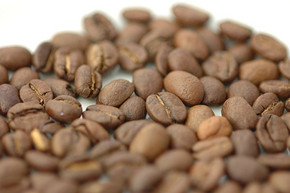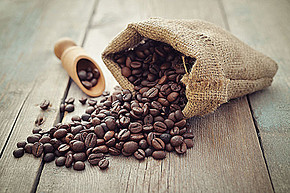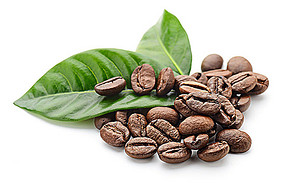Characteristics of Kenyan coffee, origin of Kenyan coffee
Follow the caf é (Wechat official account vdailycom) and found that Beautiful Cafe opened a small shop of its own.
In 1878, the British landed coffee in Africa and set up a coffee plantation in Kenya in the 19th century, when Ethiopian coffee drinks were imported to Kenya through southern Yemen. But it was not until the early 20 th century that the Bourbon Coffee Tree was saint. The Austin Mission (St.AustinMission) was introduced.

Coffee producing areas in Kenya:
Coffee from Kenya (Kenya) is mostly grown at an altitude of 1500 Murray 2100 meters and is harvested twice a year. Kenyan coffee is grown by small farmers. Kenyan coffee is produced near the Kenyan Mountains in central Kenya and is sometimes guaranteed in the name of the capital, Nairobi. Kenya AA (Kenya AA) is produced on the 17000-foot hillside of Mount Kenya near Nairobi, the capital of Kenya. Kenya AA is the largest coffee bean in the country, followed by An and B again. Its unique bitterness and wine taste are most praised by people. Located in Kenya below the equator of East Africa, the coffee beans planted are high-quality Arabica seeds. The size of the beans is medium-large, very thick and delicious, and the acidity is moderate.
The characteristics of Kenyan coffee:
People in the coffee industry regard Kenyan coffee as one of its favorite products, with wonderful and satisfying aromas, balanced acidity, well-proportioned granules and excellent fruit flavors.
Kenyan coffee grades are divided into seven grades according to the size of coffee beans and six grades according to taste. The best coffee in Kenya is bean berry coffee (PB), followed by AA++, AA+, AA, AB and so on. The fine coffee is shiny, delicious and slightly alcoholic. "Kenya AA" is particularly well received in terms of taste.
Kenyan coffee has a slightly sour, thick aroma, raw bean particles are small, green to grayish green. Kenya's coffee beans are washed Arabica species, famous for (Kenya Arabica), especially in the United Kingdom, Kenyan coffee surpassed Costa Rican coffee to become one of the most popular coffee.
Flavor: aromatic, full-bodied, with fruit flavor, rich and perfect taste
Suggested baking methods: shallow baking, medium-shallow baking
★★★: excellent
The Kenyan coffee market:
The Kenyan government takes the coffee industry very seriously, where it is illegal to cut down or destroy coffee trees. Kenyan coffee buyers are world-class high-quality coffee buyers, and no other country can grow, produce and sell coffee on a continuous basis like Kenya. All coffee beans are first acquired by the Kenya Coffee Commission (CoffeeBoardofKenya, CBK), where they are identified, graded, and then sold at weekly auctions, where they are no longer graded. The Kenya Coffee Commission only acts as an agent to collect coffee samples and distribute them to buyers so that they can determine the price and quality. The auction in Nairobi is for private exporters, and the Kenya Coffee Commission pays growers a price below the market price.
After harvesting the coffee, the Kenyan coffee plantation first sends the fresh coffee beans to the cooperative cleaning station, where the washed and dried coffee is sent to the cooperative in the form of "parchment coffee beans" (that is, coffee beans covered with endocarp) ("parchment coffee beans" is the last state of coffee beans before peeling). All the coffee is collected together, and the growers charge the average price according to their actual quality. This trading method generally works well and is fair to both growers and consumers.
Auctions are also organized to meet the needs of dispatchers. This kind of auction usually has a small auction volume (3-6 tons each), with samples with the grower's logo for buyers to enjoy. After the auction, the exporters pack according to different flavors, different qualities and the quantity required by the blenders. This provides a great deal of flexibility for the dispatcher. Quality-conscious Germans and Scandinavians are long-term buyers of Kenyan coffee. Some buyers, especially Japanese businessmen, have expressed dissatisfaction with the Kenyan coffee industry system. But in any case, Kenya's detailed rules and regulations and sound procedures are a model for all coffee-producing countries.
Kenya AA, round beans, thick flesh, good heat permeability, high precision, French baking, rich and sweet taste, mellow thickness, good expansibility, aroma and sweetness are top grade.
The best coffee grade is bean berry coffee (PB), followed by AA++, AA+, AA, AB and so on. The fine coffee is shiny, delicious and slightly alcoholic. Auctions are also organized to meet the needs of dispatchers.
The coffee is aromatic, full-bodied and fruity, with a rich and perfect taste. Kenyan coffee has a wonderful fruit flavor, tastes like BlackBerry and grapefruit, and is a favorite of many coffee gluttons. This coffee has an excellent medium purity, crisp and refreshing taste. It has a fresh flavor and is most suitable for drinking iced coffee in summer.
When tasting this coffee, if it is paired with sour fruits such as grapefruit, it will certainly give me the best coffee experience. "not much like coffee, but a bit like fruit tea" is the common feeling of many people about this kind of shallow roasted Kenyan coffee. Every year we encounter different climate and rainfall, which brings a variety of distinct and unique personalities. Take the AAPlus grade "KenyaAA+Samburu" as an example, the Samburu in 2001 has a strong aroma of black plum, the acidity is not high, and the taste is strong. The newly harvested Samburu in the winter of 2002 presents a completely different flavor, mulberry and green plum, with a little Nanyang spice (Spicy) flavor, after drinking, the aftertaste has the sweetness of green tea, the acidity is slightly higher than the year before, the taste is still strong. The common Kenyan taste is not strong, but it has a bright fruit-like flavor, some spicy and some red wine. This is how Kenya makes coffee fans full of expectations and surprises!
Important Notice :
前街咖啡 FrontStreet Coffee has moved to new addredd:
FrontStreet Coffee Address: 315,Donghua East Road,GuangZhou
Tel:020 38364473
- Prev

Kenya Coffee Cooperative Manor introduces Kenyan washed coffee beans, hand-made beans.
Following caf é (Wechat official account vdailycom) found that Beautiful Cafe opened its own shop profile: SASINI Manor is located in KIAMBU area around Mount Mountain Kenya, about 1800 meters above sea level, where the scenery is beautiful, the climate is pleasant, the light is sufficient, the soil condition is superior, it belongs to fertile acid red soil, the soil is loose, the soil layer is deep, and the drainage is good.
- Next

Kenya AA coffee bean hand brewing temperature Kenyan coffee V60 filter cup how to make it good
Follow Ka Ping (Wechat official account vdailycom) and found that Beautiful Cafe opened a small shop of its own [producing country] Kenya [producing area] Mt. Kenya Mount Kenya NyeriMeru [grade] AA [taste characteristics] outstanding flavor, with fruit aromas, lemon aromas, orange flavor, soft acidity, full and mellow taste, long finish. Kenya is located in Ethiopia.
Related
- Detailed explanation of Jadeite planting Land in Panamanian Jadeite Manor introduction to the grading system of Jadeite competitive bidding, Red bid, Green bid and Rose Summer
- Story of Coffee planting in Brenka region of Costa Rica Stonehenge Manor anaerobic heavy honey treatment of flavor mouth
- What's on the barrel of Blue Mountain Coffee beans?
- Can American coffee also pull flowers? How to use hot American style to pull out a good-looking pattern?
- Can you make a cold extract with coffee beans? What is the right proportion for cold-extracted coffee formula?
- Indonesian PWN Gold Mandrine Coffee Origin Features Flavor How to Chong? Mandolin coffee is American.
- A brief introduction to the flavor characteristics of Brazilian yellow bourbon coffee beans
- What is the effect of different water quality on the flavor of cold-extracted coffee? What kind of water is best for brewing coffee?
- Why do you think of Rose Summer whenever you mention Panamanian coffee?
- Introduction to the characteristics of authentic blue mountain coffee bean producing areas? What is the CIB Coffee Authority in Jamaica?

